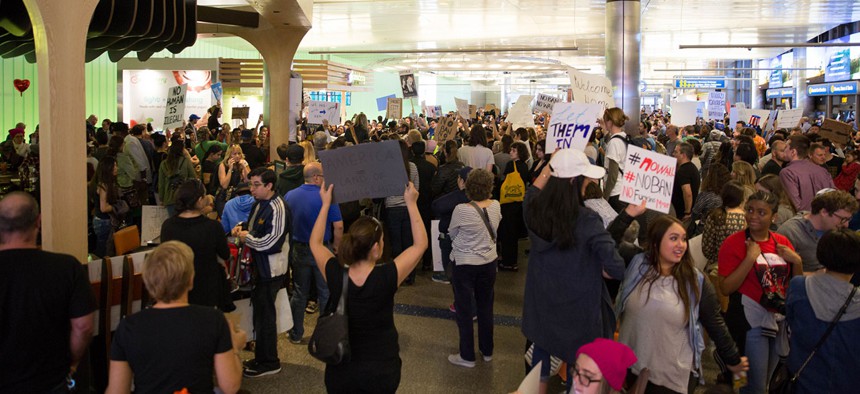
Protesters demonstrate at Los Angeles International Airport Sunday. Flickr user cindychu
In Apparent Reversal, Trump Administration Says Immigration Ban Will Not Affect Green Card Holders
Legal residents are allowed back into the U.S. after all, says the White House chief of staff.
Amid outrage, anxiety, and widespread chaos, the Trump administration on Sunday appeared to backtrack on at least one part of their sweeping actions on immigration.
U.S. president Donald Trump on Jan. 27 signed an executive order indefinitely barring Syrian refugees from entering the United States and temporarily barring all travelers from seven Muslim-majority countries. Already, the order has caused heartbreak for families whose members from affected countries with valid U.S. papers were detained and refused entry on flights. It has also sparked protests at major airports and created chaos for airlines, at least one of which hastily adjusted its flight crews to comply with the new requirements.
The confusion is equally evident in how various agencies are interpreting Trump’s executive order. The Department of Homeland Security said Jan. 28 that the sweeping executive order would bar US green card holders from Iran, Iraq, Libya, Somalia, Sudan, Syria, and Yemen. The White House told reporters that same day that green card holders from the seven countries would be addressed case-by-case. The State Department, meanwhile, said the ban would also apply to dual citizens with nationality from one of the seven countries.
On Sunday, White House chief of staff Reince Priebus backtracked on the green card piece. “As far as green card holders, moving forward, it doesn’t affect them,” he told NBC on “Meet the Press”. But Priebus also emphasized that border agents could exercise “discretionary authority” to question and detain travelers from some countries, the New York Times reported.
As of Sunday, four federal courts had moved to block or halt the president’s actions.
In Brooklyn, a federal judge ordered the government to halt the deportation of refugees and immigrants who had been detained after the order was issued. On Saturday evening, Judge Ann Donnelly granted an emergency stay for citizens of those countries on Trump’s travel-ban list who had arrived in the US with proper visas but were then stopped in US airports.
The American Civil Liberties Union and other groups had filed a lawsuit earlier in the day, challenging the detention of two Iraqi men at New York’s John F. Kennedy airport. The two have since been released. The ACLU estimates between 100 to 200 people have been detained since Trump’s executive order took effect on Friday.
Later on Saturday, a federal judge in Virginia issued a temporary restraining order valid for seven days banning the deportation of detainees at Dulles International Airport and allows them to meet with lawyers. A judge in Washington state issued a similar ruling, barring the government from deporting two unnamed individuals. Meanwhile, two judges in Boston issued a restraining order against the president on Sunday morning on behalf of two Iranian UMass Dartmouth professors, who were detained at Logan Airport despite being lawful permanent residents.
NEXT STORY: Exploiting Public Office for Private Gain






